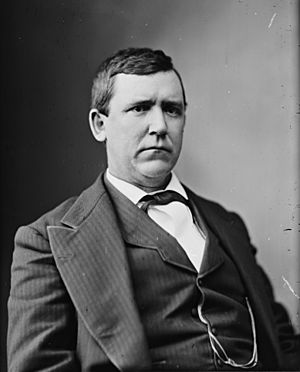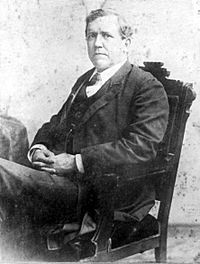Augustus Hill Garland facts for kids
Quick facts for kids
Augustus Garland
|
|
|---|---|
 |
|
| 38th United States Attorney General | |
| In office March 6, 1885 – March 4, 1889 |
|
| President | Grover Cleveland |
| Preceded by | Benjamin H. Brewster |
| Succeeded by | William H. H. Miller |
| United States Senator from Arkansas |
|
| In office March 4, 1877 – March 6, 1885 |
|
| Preceded by | Powell Clayton |
| Succeeded by | James Henderson Berry |
| 11th Governor of Arkansas | |
| In office November 12, 1874 – January 11, 1877 |
|
| Preceded by | Elisha Baxter |
| Succeeded by | William Read Miller |
| Confederate States Senator from Arkansas |
|
| In office November 8, 1864 – May 10, 1865 |
|
| Preceded by | Charles B. Mitchel |
| Succeeded by | Constituency abolished |
| Member of the Confederate House of Representatives from Arkansas's 3rd district |
|
| In office February 18, 1862 – November 8, 1864 |
|
| Preceded by | Constituency established |
| Succeeded by | David Carroll |
| Delegate to the Confederate States Provisional Congress from Arkansas |
|
| In office May 18, 1861 – February 17, 1862 |
|
| Preceded by | Constituency established |
| Succeeded by | Constituency abolished |
| Personal details | |
| Born |
Augustus Hill Garland
June 11, 1832 Covington, Tennessee, U.S. |
| Died | January 26, 1899 (aged 66) Washington, D.C., U.S. |
| Resting place | Mount Holly Cemetery |
| Political party | Whig (before 1855) American (1855–1859) Constitutional Union (1859–1860) Democratic (1860–1899) |
| Education | St. Mary's College, Kentucky St. Joseph's College, Kentucky (BA) |
| Signature | |
Augustus Hill Garland (June 11, 1832 – January 26, 1899) was an important American lawyer and politician from Arkansas. He was a member of the Democratic Party. Garland held many high positions during his life. He served in both houses of the Congress of the Confederate States and the United States Senate. He also became the 11th Governor of Arkansas (1874-1877). Later, he was the 38th Attorney General of the United States (1885-1889).
Contents
Early Life and Education
Augustus Garland was born in Covington, Tennessee on June 11, 1832. His parents were Rufus and Barbara Garland. When he was young, his family moved to Arkansas.
Garland went to Spring Hill Male Academy from 1838 to 1843. He then attended St. Mary's College and graduated from St. Joseph's College in 1849. After college, he taught at Brownstown School. He later returned home to study law.
In 1853, Garland became a lawyer. He started his law practice with his stepfather. He moved to Little Rock in 1856. There, he became a very well-known lawyer. He even argued cases before the highest court, the Supreme Court of the United States, starting in 1860.
Starting in Politics
Garland was involved in politics from the 1850s. He supported the Whig and "American" parties. In the 1860 presidential election, he supported the Constitutional Union Party.
American Civil War Period
When Abraham Lincoln became president, many Southern states left the United States. Garland did not want Arkansas to leave the Union. He spoke against it at a meeting in Little Rock.
However, after Lincoln asked Arkansas to send troops to fight the Southern states, Garland changed his mind. He then supported Arkansas joining the Confederacy. His older brother, Rufus Garland, even led a Confederate army company.
Serving the Confederacy
Garland was chosen to be part of the Provisional Confederate Congress. Later, he was elected to the Confederate House of Representatives in 1861. He worked on important committees there. In 1864, he was appointed to the Confederate States Senate. He supported President Jefferson Davis. Garland returned to Arkansas in early 1865. He wanted to help Arkansas rejoin the Union as the war was ending.
After the War
After the Civil War, President Andrew Johnson pardoned Garland in 1865. However, Garland was not allowed to practice law again without taking a special oath. This oath was required for former Confederate officials.
A Big Court Case
Garland challenged this rule in a famous court case called Ex parte Garland. He argued that the law was unfair and unconstitutional. In 1867, the U.S. Supreme Court agreed with him. This decision was very important for many former Confederates.
Return to Arkansas Politics
In 1867, Arkansas lawmakers chose Garland to be a U.S. Senator. But he could not take his seat because Arkansas had not yet fully rejoined the Union. Garland continued his law practice. He also helped start the Southern Historical Society in 1869.
In 1872, Garland became a key helper for Governor Elisha Baxter during a state conflict. He also helped write the new state constitution. With strong support, he was elected Governor of Arkansas.
Governor of Arkansas
Garland faced many challenges as Governor. The state had a large debt of $17 million. He worked with a finance board to greatly reduce this debt in just two years.
Garland also strongly supported education. He pushed for schools for the blind and deaf. He helped improve the Arkansas Industrial University, which is now the University of Arkansas. He also helped create the Branch Normal College, now the University of Arkansas at Pine Bluff. This school made education available for African-American students.
Serving in Washington, D.C.
United States Senate
In 1876, Garland was elected to the United States Senate. He was re-elected in 1883. As a Senator, he worked on important issues. These included reforming taxes, improving national transportation, and regulating trade between states. He also supported a federal prison system and help for education.
Attorney General of the United States
In 1885, Garland resigned from the Senate. He accepted the job of Attorney General of the United States. This was offered by the new President, Grover Cleveland. Garland was the first person from Arkansas to join a President's cabinet.
Soon after taking office, Garland faced a political issue. He had been involved with a telephone company before becoming Attorney General. This company was being sued by the Bell Telephone Company. Garland was asked to file a lawsuit against Bell to break their control over telephone technology. He did not want to do this. However, while he was on vacation, the Solicitor General authorized the lawsuit.
This led to a long investigation by Congress. Despite the difficulties, President Cleveland continued to support Garland. In 1886, Garland became the first cabinet secretary to be officially criticized by Congress. This happened because he did not provide documents about the firing of a U.S. Attorney.
Later Life and Death
When President Cleveland lost his re-election in 1888, Garland left office in 1889. He went back to practicing law in Washington, D.C.. He also wrote several books about law and the U.S. Constitution.
On January 26, 1899, Garland was arguing a case before the Supreme Court. He suffered a stroke and passed away a few hours later. He was buried in Mount Holly Cemetery in Little Rock, Arkansas.
Legacy
Several places are named after Augustus Garland. These include Garland County, Arkansas, and the cities of Garland, Texas and Garland, North Carolina.
See also
- List of Confederate States senators
- List of governors of Arkansas
- List of people from Tennessee
- List of people pardoned or granted clemency by the president of the United States
- List of United States senators from Arkansas
 | Kyle Baker |
 | Joseph Yoakum |
 | Laura Wheeler Waring |
 | Henry Ossawa Tanner |


